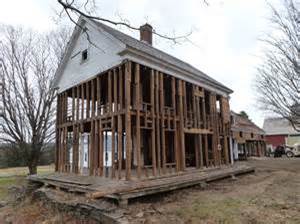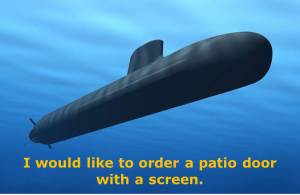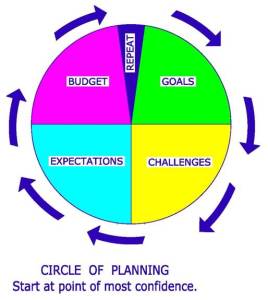You can print this article directly from our website. Click the Print button located on your screen’s upper or lower left side. You can also print the *.pdf version Here.
Important Considerations When Choosing Your Next Room.
NAMM, Anaheim, 2019 Presentation by Steven Klein

“I have been involved with studios and production and building my whole life.“
| Here are essential items most people miss or ignore. Each topic could use all of my time, so I cannot give detailed explanations. Recognize your mistake and don’t repeat it, or best yet, don’t make one of these mistakes. |

1. OLD WOOD
New wood contains water, and the wood reacts like a living thing encasing nails and screws. This gives the attachment strength. Old wood cannot encase attachments, and nails and screws will not have the strength to hold the heavyweight requirements of studio construction. Imagine putting a nail in a rock.

2. WATERPROOFING
Many garages and buildings have bare uncovered walls. Water is not an issue because moisture can evaporate, so the interior seems dry. Also, many slabs are built level with the surrounding soil, so water will quickly accumulate near the foundation. Proper studio construction requires the walls to be airtight. The difference between the humidity outside and the dryness of air-tight walls attracts moisture that may not evaporate.
Result = mold, termites, cracks.

3. STRUCTURAL ENGINEERING
This is not intuitive. Structural engineers are required specialists, particularly in seismic and extreme weather regions. Studio construction must be heavy and rigid. Many times, builders overbuild; this wastes money. Builders often underbuild, which may be dangerous or cost more to retrofit later. Protect your investment and consult with an engineer.

4. INCONGRUENT METHODS
Everything is interrelated. Mistakes like overbuilding the walls with a weak door, floor, or ceiling. Or building an equal or lesser partition in front of an existing partition believing “room within a room” nonsense. Or placing bass traps in a raised foundation bedroom.

5. INCONGRUENT METHODS PART II
Mr. Bass has left the building. Or placing bass traps in a raised foundation bedroom. Misunderstanding and improper use of bass traps is epidemic. Go outside of the studio – What do you hear? If you answered “BASS,” how in the world are you going to “trap” what isn’t there?

6. DOOR WEAKNESS
Placement; the last place to put a door is in the corner. Types; Many patio sliders are poor choices or over-priced. I do my best to offer clients alternative choices. Though, a $30,000 slider may be a nice touch. Hardware; overpaying for sophisticated seals then installing with inexperienced handyman or do-it-yourselfers.

7. INABILITY TO EXCEED YOUR EXPERIENCE
This is a truth we all have to deal with, and it appears in all areas of our lives. Very often, research only involves finding and using information that agrees with your experience. So even when we are in pursuit of more sophisticated knowledge, one can easily dismiss other points of view. It takes direct, concentrated effort to exceed your experience. I often say, find a source or someone you respect and stick with them.

8. POOR ROOM RATIOS OR INAPPROPRIATE USE OF SHAPE
SHAPE is often misunderstood and mistakenly executed. Contemporary designers would rather have a rectangle with proper ratios for a control room.
Quoted from: *F. Alton Everest, Master Handbook of Acoustics.
“The popularity of rectangle rooms is due part to economy of construction, but it has its acoustical advantages. The axial, tangential, and oblique modes can be calculated with reasonable effort and their distribution studied. For a first approximation, a good approach is to consider only the more dominate axial modes, which is a very simple calculation. Degeneracies (mode pile-ups) can be spotted and other room faults revealed.”

9. SELF EDUCATION
Acoustics is not an intuitive science; it is a very complex subject. Nonetheless, all people are sensitive to sound and acoustics, leading to a superficial understanding. I repeatedly see complex problems addressed with simplified solutions and simple problems expanded to fit complex and costly remedies.
| I encourage increasing one’s knowledge. The wiser you are, the most likely you are to ask the right questions. However, without widespread experience, odds are you will waste resources and opportunities. – Steven Klein |
GETTING STARTED …
I see many projects that go wrong in the first step. I observe the Titanic pulling away from the dock far too often. Here is the knowledge that can save you.
The article is on the INFO tab of our site.

Get a Bid, On What?
| I am often asked for an estimate, “How much will it cost to soundproof my garage?” or some variation, i.e., bedroom, basement, pool house? Or this question: “Can you come out and give me a bid to transform my room into a music production space?” Or the combination – “I’d like to get an estimate to build a studio. Can you come out and give me a bid?” My first response is, “Fair question, but everyone’s situation is unique. Do you have a plan?” Far too often the answer is – “No, we want to get a bid.” |
The purpose of this article is to give you the knowledge necessary to begin your project and ensure successful completion. If you read the opening statements and don’t see the inherent problem you may be doomed to big issues at the end of the project.
To properly manage your project having a plan ensures successful completion. If you invite contractors to come out and sweet talk prices, without a plan you may be asking for trouble. Each contractor may bid on different insulation; R-11, R-13, or mineral fiber? And different studs; metal, D.F.#2, D.F.#1, or better? More importantly- (1) What is the best choice for your budget? (2) Is your wall to be layered with a vinyl barrier, RC-2 channel, drywall, or the worst choice – Drywall/Soundboard/Drywall? (3) How do you know which contractor has the best choice and fairest price if they all have something different in mind?
“You must first have a plan to get a comprehensive contractible bid.”
| PROPER PLANNING Gives all parties reasonable expectations, creates the greatest choices for owners, keeps contractors honest, prevents mistakes, enables accurate scheduling, and saves time and money. When building you cannot evade this truth: “Changes are expensive, Mistakes are more expensive, and Disappointments are priceless.” |
The Benefits of Starting With a Plan
- Ability to get professional advice, to make decisions that fit your needs and budget.
- Better planning will attract better contractors. The best contractors are accustomed to designer and architect specifications. Without a plan, you will only attract glorified carpenters.
- You can accurately shop to compare prices.
- When your project is finished, plans document what has been done and how it was done. In the future; If you sell, buyers will value seeing a plan. If you need upgrades or repairs, contractors will know what to do. If you have an insurance claim, adjusters can better assign the true value.
- Full planning can give the flexibility of completing your project in stages.
- Project accurate timelines and fixed costs.
In conclusion, to assure a successful venture, hire professional contractors, obtain private comfortable rooms, get the most for your dollar, and most important – fulfill your expectations. Create a plan, then get a bid.
I am often asked for an estimate, “How much will it cost to soundproof my garage?” or some variation, i.e., bedroom, basement, pool house? Or this question: “Can you come out and give me a bid to transform my room into a music production space?” Or the combination – “I’d like to get an estimate to build a studio. Can you come out and give me a bid?” My first response is, “Fair question, but everyone’s situation is unique. Do you have a plan?”Far too often the answer is – “No, we want to get a bid.” |
Can’t We All Just Get Along?
Arguments about acoustics and design
Chaos (Merriam-Webster Dictionary: the inherent unpredictability in the behavior of a complex natural system.)
We must first realize that science is challenged by chaos. I present the thesis that talent supersedes everything. Since this is immensely abstract and unknowable where it fits in the analysis, chaos is exposed. Talented people will work in the worst conditions and have great results. The untalented can work in the greatest environments and never produce. There is an ambivalent conclusion about what works.
The reality that great music/production can come from adverse conditions leads one away from the true objective science of acoustics and physics.
Superstition (Merriam-Webster Dictionary: a belief or practice resulting from ignorance, fear of the unknown, trust in magic or chance, or a false conception of causation.)
Success in music and audio is difficult, to say the least. No one has success immediately. Success requires discipline, love, talent, practice, and opportunity. It may be fleeting as artists are often judged and condemned by their last piece of work. So it is understandable that professionals will hold onto or perpetuate what brought them success in the past. Resisting change is a natural instinct, even though it may oppose objective knowledge.
Opinion (Merriam-Webster Dictionary: a view, judgment, or appraisal formed in the mind about a particular matter.)
When facts are known and presented that contradict a presumption they are often referred to as opinions. I hear this all the time, “Well that is your opinion.” Pretty much that means they are not going to use my advice. What I understand to be fact is to be dismissed. When math and physics are dismissed by presumption everything becomes a matter of opinion.
Experience (Merriam-Webster Dictionary: the conscious events that make up an individual life.)
Studio design and construction require many disciplines, i.e., architecture, mechanical, structural, musical, interior design, ergonomics, costs, regulations, etc. It is impossible for any one person to be fully competent? We are all working at the limits of our experience.
Correspondingly is the quality of the experience. There is a great difference between 10 years of experience versus one year of experience practiced 10 times.
Technology
The state-of-the-art is ever-changing. Advances are being made in every aspect. Considerations that may have been relevant in the past no longer have the priority once held. Bass traps are a prime example, see my article, Time to Rethink Bass Traps.
Moreover, rooms, design, and acoustics reflect the medium they are creating. Size, reverb times, frequency response, stereo versus multi-channel, audio/video content, performance, audience, and reproduction, are a variety of factors influencing architecture and acoustics. Priorities in one room may have very little in common with another.
Chat Rooms
The abundance of internet chatter is immeasurable. I have learned from contributors yet I have read many arrogant as well as inappropriate conversations. The reality is that professionals should not seek guidance from semi-pros or amateurs. Most people get it wrong and are out of their element to advise.
My advice, as I have written in other articles, is “Find someone you trust and stick with them”. Gathering information from different sources may lead you to improper combinations. Another risk is to find poor information you agree with, so why bother?
Inefficiencies, conflicts, and problems with “vernacular” acoustic design is the subject of this article.
Money
I have great respect and admiration for anyone who pursues music, architecture, and acoustics, with a passion for helping others in their creative and business aspirations. There are many enormously talented, gifted people at work.
However, there are unscrupulous, nearly deaf individuals and companies anxious for your money. Superstores simplify acoustics to sell at discount prices and vendors over-selling their products with unsubstantiated or exaggerated claims, as well as fabricators whose primary motivation is to get your money.
Sometimes it works well, even a broken clock is right twice a day. Often people have so much invested, financially and/or emotionally, they falsely believe. The effect this has on our community is the introduction of many false precepts.
Bargain Hunting
Beware of discount elevators, discount submarines, and discount acoustic products. If the price is too low you will lose. Do not think you can outsmart the marketplace. If it seems too good to be true, it will be false.
There are poorly experienced, greedy, uneducated people all trying to win your business. Buyer beware!
Unqualified self-proclaimed experts
There are many talented people that have years of experience inside studios. This does not make them acousticians. Take the analogy of supermarkets. I like to cook and have years of experience inside supermarkets. I know fresh food is properly organized at a good price, a top-quality supermarket. Given the task I could not build, design, manage or organize a great supermarket. Asking my friends seems like a ridiculous choice. Looking for guidance from Google is equally absurd.
Because someone has studio experience does not qualify them as a designer. I have years of experience recording guitar players. Still, I cannot play the guitar.
This also applies to many builders. If they have not studied acoustics, are you sure you are in the best hands?
Conclusion
It is impossible to prove a negative, so one goes through life not knowing what could have been. I see many victims of bad advice, misinformation, and ignorant decisions. The help and guidance of proven professionals for your work environment will be well worth it.
“Find somebody you trust and stick with them.”
Thank you for your interest. There are many more articles along with plans, guidelines, photos, and products on our website. Your support is greatly appreciated; bookmark our page, join the mailing list, like us, and refer us.
You can print this article directly from our website. Simply click the Print button located on the upper or lower left side of your screen. You can also print the *.pdf version Here.



